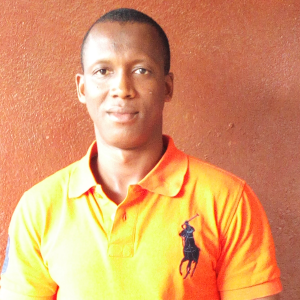From the ground up- rebuilding health systems after Ebola

We met with Dr Sulaiman Jalloh at the Infectious Diseases Data Observatory (IDDO) office in Oxford. A medical doctor from Sierra Leone, Sulaiman played a critical role in saving lives and crises management during the Ebola outbreak in 2014.
Since then he has successfully completed the MSc International Health & Tropical Medicine from the University of Oxford and is currently working at IDDO as a Research Intern. Sulaiman tells us about his experience of treating Ebola patients and his ambitions of developing effective public health policies in the future.
Growing up in an environment where it was difficult to access basic facilities such as safe water and healthcare, shaped his ambitions to become a medical doctor. He completed his medical training from the College of Medicine and Allied Health Sciences at the University of Sierra Leone. The college did not have a central campus, and Sulaiman had to travel to three different hospitals across Freetown, the capital of Sierra Leone, to attend classes.
After graduating with his medical degree, Sulaiman started working at the Ola During Children’s Hospital located in the Freetown. Ola During Children’s Hospital is the largest paediatric hospital in Sierra Leone with the highest caseload of patients (around 300 a day) in the country.
The outbreak in 2014 was unprecedented and it was the first time that Sierra Leone was experiencing an Ebola epidemic. In 2014, Sierra Leone had only recently emerged from years of civil war and unrest that left basic health infrastructures severely damaged. Weak road systems, transportation services and telecommunications were contributing factors towards the rapid spread of the disease.
During outbreak, Sulaiman was one of the very few doctors in Sierra Leone trained for an Ebola outbreak response in the country.
Sulaiman remembers the first confirmed positive case at the hospital.
When the hospital reopened, Sulaiman was appointed as the Clinical Lead of the ‘holding centre’ at the hospital. The holding centre was a facility where patients who presented with Ebola symptoms were first admitted. Sulaiman was working 12-hour shifts, seven days a week. He was responsible for treating patients in the red zone (confirmed Ebola cases) and supervising more than 60 frontline staff that included doctors, nurses, and other auxiliary medical staff.
Supervising frontline staff also meant managing their fears, encouraging them and counselling them. Everyone interacting with patients was at risk of being infected with the disease. At one point, a doctor from the same hospital was infected and eventually passed away. This affected the morale and zeal of other colleagues and Sulaiman had to appear strong and encourage others to ‘keep up the fight’. Sulaiman took on these responsibilities being fully aware that every second could be his last. According to sources, health workers were 21–32 times more likely to be infected with Ebola than the general adult population. An unprecedented number of health workers were infected, with an estimated 221 deaths, which is an about 21% of the overall health work force in Sierra Leone (NCBI, 2019).
As the caseload increased, Sulaiman started doing 24-hour shifts every two days. The hospital was understaffed, with each doctor attending to 9 patients at any given time. While the international community followed the deadly outbreak on the news, Sulaiman describes the ground reality as ‘very scary and challenging’.
Personal Protective Equipment consists of thick protective yellow impermeable suits, rubber boots and respirator masks, two pairs of rubber gloves, thick goggles and rubber full-length aprons to protect doctors from the disease. Being dressed in PPE can get extremely hot in a warm, humid climate, with dehydration and fainting from heat exhaustions being ever-present dangers.
According to a statement made by WHO, total number of 8,704 people were infected and 3,589 people died of Ebola in Sierra Leone. During the Ebola outbreak, Sulaiman and his colleagues worked with the government, local and international NGOs, health partners and other doctors to develop a coordinated response to the outbreak that included treatment procedures.
Reflecting back on his experience, Sulaiman identifies things that could have been done differently to manage the outbreak.
Working with different partners, led Sulaiman to realise that many health challenges in Sierra Leone can be solved through a public health approach, rather than individual patient care. This fuelled his passion for research.
In the 2018, Sulaiman came to Oxford to study the MSc International Health and Tropical Medicine course based in the Nuffield Department of Medicine. He was one of the eight Sierra Leoneans awarded the Chevening Scholarship in 2018. The course aims to strengthen a student’s knowledge and understanding of health challenges in resource-limited settings. The course also helped Sulaiman develop his communication and leadership skills.
Now working at IDDO, Sulaiman hopes to prioritise research on treatment and increase the focus on social aspects of Ebola. He is currently developing a system for health researchers to report symptoms and outcomes of patients with emerging infections in a standardised way. This will allow clear characterisation of the progression of the disease and is important to inform the creation of core, defined outcomes for future research.
Talking about his future ambitions, Sulaiman says
